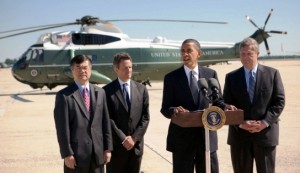Ford CEO Alan Mulally will serve on the President’s Export Council (PEC) the White House announced today.
“Export growth leads to job growth and economic growth,” Obama said, as he named 18 business, labor and government leaders to a new export advisory council, “at a time when jobs are in short supply, building exports is an imperative.”
“President Obama recently set a national goal of doubling U.S. exports over the next five years. We applaud this forward-looking goal and I am honored to serve on the President’s Export Council and work toward helping America achieve it,” Mulally said in a Ford statement.
Ford Motor already exports about 250,000 vehicles annually – the equivalent of one final assembly plant, not including associated engine, transmission and other parts component plants. Vehicles exported from North America include the E-Series, Escape, Escape Hybrid, Expedition, Explorer, Focus, F-150, F-Series Super Duty, Mariner, MKS, Mustang, Mountaineer, Navigator, Ranger, and Taurus models.
It wasn’t immediately clear if this includes “exports” to Canada, and we await verification from Ford.
“At Ford, we believe an export-driven strategy is critical to achieving our shared goals of economic growth, job creation and a sustainable future. One thing is certain, for exports to grow we must ensure that market access for manufactured goods remains at the center of U.S. trade policy,” said Mulally.
Since the President called for the NEI in his State of the Union Address, the White House claims that “significant progress has been made on each of its five main objectives,” including:
- Improved advocacy efforts on behalf of U.S. exporters: The Department of Commerce has coordinated 18 trade missions with over 160 companies participating in 24 countries.
- Increased access to export financing: Ex-Im has more than doubled its loans to support American exporters from the same period last year, helping to support nearly 110,000 jobs.
- Reinforced efforts to remove barriers to trade: In March, the United States reached an agreement with China to reopen the Chinese market to U.S. pork and pork products. In June, the United States agreed with Russia to reopen the Russian market to U.S. poultry exports. These steps are worth more than $1 billion.
- Enforcement of trade rules: Last week the WTO ruled that European governments subsidized Airbus’s large civil aircraft. This ruling is expected to sustain and even restore jobs to American aerospace workers by leveling the playing field for the U.S. aerospace industry.
- International promotion of policies leading to strong, sustainable and balanced economic growth: These last 18 months have been the most effective period of international economic cooperation in generations with global growth replacing economic contraction.
Critics, of course, contend the opposite, pointing out that Obama’s party is facing a tough election year with an ongoing and fragile jobless recovery. The Korean and Chinese governments, among others, are also against making changes to trade agreements and/or currency valuations that would help open up markets for U.S. exports.
Since Obama took office, the economy has eliminated between two and three million jobs — on top of the massive losses that occurred during the final years of the Bush Administration — and unemployment remains at levels not seen since the Great Depression, while the U.S. budget deficit soars to the highest level since WW2.
These negative trends are prompting a great policy debate in Washington as both Democrats and Republicans maneuver for political advantage.

